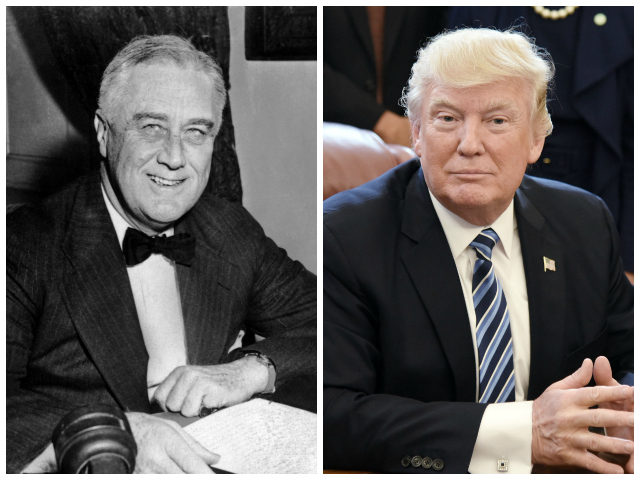The thriving U.S. economy was supposed to be President Donald Trump’s ace in the hole in the 2020 presidential contest.
Those days are gone, obviously. But many of the president’s supporters may still be overestimating the likelihood that an economic recovery will be strong enough to carry the president into a second term.
The odds are that even if the economy bounces back and starts growing again once the shutdown orders are lifted and public anxiety diminished, the unemployment rate will remain in the double-digits through the end of the year. That means President Trump will be asking Americans to re-elect him with 10 to 15 percent unemployment.
High unemployment is not a barrier to re-election. President Franklin Delano Roosevelt managed to get re-elected twice when unemployment was near or above 15 percent. And that experience provides some insights into what it will take for Trump to win re-election.
We do not yet know how bad the economy is going to get this year but most signs point to a cataclysmic contraction. Tens of millions of Americans have lost their jobs. The housing market has come to a standstill. Construction, manufacturing, retail have either fully or partially shutdown. No one is making cars in this country for the first time in generations.
The Congressional Budget Office on Friday estimated that the economy contracted at a 3.5 percent annualized rate in the first quarter of the year, meaning the economy would be 0.9 percent smaller than it was at the end of 2019. Economists think the number will be even worse: 3.8 percent contraction.
Those dire figures are for the period covering January through March. The second quarter, April through June, is likely to be far worse. The CBO forecasts the economy will contract at a 39.6 percent annualized rate and the unemployment rate will jump to 14.0 percent. Neither of those is particularly unrealistic. If anything, the unemployment rate may be even higher and the GDP contraction than the CBO expects. I’m not a big fan of the CBO’s super-secret modeling of the economy but there’s no reason to think they’re over-estimating the impact here.
The CBO expects the economy to recover in the third and fourth quarters. It forecasts the economy growing at a 23.5 percent annualized rate in the third-quarter and a 10.5 percent annualized rate in the fourth quarter. Even with those strong second-half numbers, however, the full year will come in at a 5.6 contraction.
The unemployment rate is likely to stay high for quite a while. The CBO sees unemployment climbing to 16 percent in the third quarter and falling to 11.7 percent in the fourth quarter, which includes election day.
The historical lesson FDR’s re-election teaches us comes in two parts. First, the public may be willing to reward a president who has policies they see as effectively easing the pain caused by the economic contraction and working to restore employment. So President Trump needs to think not just about re-opening the American economy but what kind of ‘deal’ he can propose for Americans who will still be suffering once we’ve re-opened. One policy suggests itself readily: a real immigration moratorium that will boost wages and employment among American workers.
Another policy suggestion: broad and high tariffs. The job-killing so-called “free trade” policies of the last three decades were already unaffordable when Trump was elected in 2016. Now they amount to a liquidationist program for the American economy. Trump should raise tariffs on everything we can produce in the United States high enough to encourage American consumers to spend money on products that create American jobs rather than import products from abroad. This can be a way of jump-starting the process of reconfiguring the American economy so that we never again find ourselves so badly dependent on foreigners to supply us with things we could be making ourselves.
The second lesson from the FDR experience is that the public may re-elect a president if unemployment is moving in the right direction. In each of Roosevelt’s re-elections, unemployment was moving lower. That’s likely going to be the case by November but making sure unemployment keeps falling should be a top priority for Trump.
The coronavirus is not Trump’s fault. The economic collapse it has brought about should not be blamed on Donald Trump. But Americans elected Donald Trump to fix what had gone wrong. And they will not re-elect Donald Trump unless they think he is fixing America again.

COMMENTS
Please let us know if you're having issues with commenting.